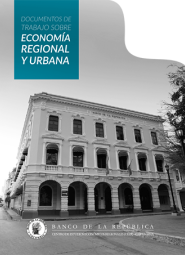The Democratic Security Policy: Socioeconomic Effects in the Rural Areas, 2002-2006
La serie Borradores de Economía es una publicación de la Subgerencia de Estudios Económicos del Banco de la República. Los trabajos son de carácter provisional, las opiniones y posibles errores son responsabilidad exclusiva del autor y sus contenidos no comprometen al Banco de la República ni a su Junta Directiva.
This paper measures the impact of strengthening the security policy on the rural labour market in Colombia by exploiting the structural change in the number of rural seizures. The new policy produced dissimilar effects across gender, age-groups, and types of occupation. For adults, especially for women, there were important reductions in the labour participation, with simultaneous reductions in the income across the most representative types of workers, self-employees and day-laborers. For male youths and children there was an increase in the labor participation through the day-labor activities, while females seemed to participate less as self-employees. In general there was a socioeconomic loss in terms of reductions of adult’s labour supply and income, while for youths and children there is a differentiated effect by gender in the labour participation, and no significant connections were found with school enrollment.


















































